Flour Sacks
During the Depression, Dad always had a job although probably not a high paying job. But many people did not have jobs. My impression, however, was that we were poor. That was never really accurate, but we had a large family and it must have been a challenge to support us all. Particularly when Grandpa and Verlin would show up for long periods of time with a bunch of kids. But Dad farmed on the side and had a farm crew to operate ‘combines’ for hire. He worked hard supporting us and I have always admired him for that. Of course, Mother was even more of the hard-working one. With all of us kids, sewing our clothes, gardening, seeing about the chickens, etc., she was one hard-working woman! And Dad always managed to find places that he needed to be. Mother was left to make things work. I never felt all that affectionate about mother, but I did really admire her for how hard she worked taking care of us all. She just seemed ‘harsh’, but with her lot in life, who wouldn’t act ‘harsh’.
Like you, I remember having shirts made out of flour sacks. She didn’t sew all that well, but she could turn out a lot of clothes. And mother was quite a gardener and we ate pretty well out of the garden in Haskell. And when we lived in Haskell, we had a milk cow (which I hated having to milk), hogs, and a beef or two that grazed in the little pasture behind our house. My reason for hating to milk the cow was that I had to be there every morning and every night to do that chore. Still, when we moved to Rankin, all of a sudden, I didn’t really have any chores to speak of. You girls were always busy, but as a boy out on the oil lease, there wasn’t too much for me to do. It was a pretty boring life.
I do remember the war years where sugar was rationed as was gasoline. Of course, Dad always had farm equipment and he managed to keep his gas tanks full since farmers received extra rations. Tires were rationed, too, and that was more of a problem since they were really sorry to begin with. And I also remember that sugar was rationed. But Dad would buy honey. Lots of it. I remember going to Colorado once during those years and Dad bought 10 five-gallon cans of honey. (He probably did that more than once, but I just remember that one time.) We were pulling a trailer of some sort to haul the honey in and I remember that one of the cans sprang a leak. Talk about a mess! I do remember that it was hard to get the honey to dissolve in our cereal.
Well, that is probably more than you wanted to hear. I was just enough older than you to have more memories (I would guess) of those times than you might have.
Like you, I remember having shirts made out of flour sacks. She didn’t sew all that well, but she could turn out a lot of clothes. And mother was quite a gardener and we ate pretty well out of the garden in Haskell. And when we lived in Haskell, we had a milk cow (which I hated having to milk), hogs, and a beef or two that grazed in the little pasture behind our house. My reason for hating to milk the cow was that I had to be there every morning and every night to do that chore. Still, when we moved to Rankin, all of a sudden, I didn’t really have any chores to speak of. You girls were always busy, but as a boy out on the oil lease, there wasn’t too much for me to do. It was a pretty boring life.
I do remember the war years where sugar was rationed as was gasoline. Of course, Dad always had farm equipment and he managed to keep his gas tanks full since farmers received extra rations. Tires were rationed, too, and that was more of a problem since they were really sorry to begin with. And I also remember that sugar was rationed. But Dad would buy honey. Lots of it. I remember going to Colorado once during those years and Dad bought 10 five-gallon cans of honey. (He probably did that more than once, but I just remember that one time.) We were pulling a trailer of some sort to haul the honey in and I remember that one of the cans sprang a leak. Talk about a mess! I do remember that it was hard to get the honey to dissolve in our cereal.
Well, that is probably more than you wanted to hear. I was just enough older than you to have more memories (I would guess) of those times than you might have.
Hit by a train and lived to tell about it
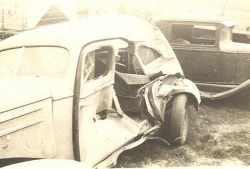
In 1936, Jim and Mary Jo left the children with Harvey and Earlene Eason. They were on their way to Wichita Falls to meet their cousins and friends, Jesse and Wirt Shellman, where they were to go on to the Texas Centennial. Instead, Jim and Mary Jo were hit by a train in Seymour, Tx. Mary Jo said that Jim was not paying attention and was talking when the train plowed into the back portion of their 1935 "Master" 4- door Chevrolet. They were pushed approximately 155 feet down the track before stopping. They managed to get the car dislodged, paid for a train ticket and continued on to the Centennial on the same train that hit them.
Lloyd-May 22, 1997
According to the suit that Dad and Mother filed (but lost) the Doddlebug (train) didn't blow its whistle as it proceeded through Seymour. The Doodlebug hit the car and dragged it 155 ft down the railroad track. (Isn't it funny what you can and cannot remember at times? I'd bet that the 155 feet figure is accurate. My mind tends to remember numbers better than it remembers words) The train hit the back end of the car and the car was a total wreck. I remember seeing a picture of that wrecked car from time to time.
It was said that had anyone been riding in the back seat they would have been killed or seriously injured. So an angel kept someone from riding in the back seat. We were just children and were in school and could not go on the trip. Also the angel protected all of us by not having the Doodlebug hit the car where Dad and Mother were riding.
We could have been orphans so easily. How lives would have changed had that accident happened to all of us. In the first place, there wouldn't have been Sandra, Glenda, or Martha or Mary.
As I recall we found out about the accident through a news account. I don't think Dad and Mother called us. I don't know if we had a phone then or not. They probably thought that it would be better not to let us know since they weren't hurt.
Dad and Mother still needed to get to Wichita Falls to meet Wirt and Jessie. They couldn't drive the wrecked car. But they had close contact with another means of transportation; the Doodlebug. They bought tickets and rode the Doodlebug that ruined their car on to their Wichita Falls destination. The ticket price that I remember they mentioned was $4.00. I don't know if that was $4.00 each or $4.00 for the two of them. Yes, Dad and Mother proceeded with their trip even though their car had been wrecked. I doubt if they had much fun at the Centennial though. I never heard them say.
Lloyd-May 22, 1997
According to the suit that Dad and Mother filed (but lost) the Doddlebug (train) didn't blow its whistle as it proceeded through Seymour. The Doodlebug hit the car and dragged it 155 ft down the railroad track. (Isn't it funny what you can and cannot remember at times? I'd bet that the 155 feet figure is accurate. My mind tends to remember numbers better than it remembers words) The train hit the back end of the car and the car was a total wreck. I remember seeing a picture of that wrecked car from time to time.
It was said that had anyone been riding in the back seat they would have been killed or seriously injured. So an angel kept someone from riding in the back seat. We were just children and were in school and could not go on the trip. Also the angel protected all of us by not having the Doodlebug hit the car where Dad and Mother were riding.
We could have been orphans so easily. How lives would have changed had that accident happened to all of us. In the first place, there wouldn't have been Sandra, Glenda, or Martha or Mary.
As I recall we found out about the accident through a news account. I don't think Dad and Mother called us. I don't know if we had a phone then or not. They probably thought that it would be better not to let us know since they weren't hurt.
Dad and Mother still needed to get to Wichita Falls to meet Wirt and Jessie. They couldn't drive the wrecked car. But they had close contact with another means of transportation; the Doodlebug. They bought tickets and rode the Doodlebug that ruined their car on to their Wichita Falls destination. The ticket price that I remember they mentioned was $4.00. I don't know if that was $4.00 each or $4.00 for the two of them. Yes, Dad and Mother proceeded with their trip even though their car had been wrecked. I doubt if they had much fun at the Centennial though. I never heard them say.
Oklahoma Territory
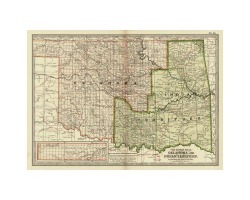
Mary Jo moved from Oklahoma to New Mexico early in her life. They moved in two covered wagons with her brothers and sisters to Broadview, New Mexico. She had never been to public school and started school in Friendship. She graduated from Grady New Mexico in 1926. Charlie Justus (Mary Jo's brother) went back to Oklahoma and met the "little crippled man's" son, James. When he got home, he told Mary Jo about Jim and she was interested so she wrote Jim a letter. He soon came to see her. Mary Jo said in a 1991 interview, "He really remembered my sister, Jewel-she had such beautiful hair, but we began to court soon after that." It started a life long romance.
Valedictorian
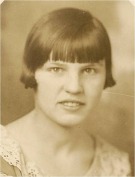
Mary Jo graduated from Grady High School in Grady, New Mexico in 1926. She played basketball for her high school and played running center. Her future sister-in-law, Ella played jumping center. Mary Jo said they were really good. Mary Jo was Valedictorian of her class of 4. Her children teased her because it was only a class of 4, but she told them "it didn't matter if it was 4 or 100, I still would have still been first."
Marriage proposal
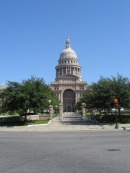
Jim proposed to Mary Jo on the steps of the Texas State Capitol building in Austin, Texas. They were married in Abilene, Texas by M.V. Showalter in their home.
Shell Oil Company

During the first years of Mary Jo's and Jim's marriage, Jim did odd jobs such as hauling trash for the town of Duke, Oklahoma. But Mary Jo said that "there was just something about Jim that made people trust and like him." He got a job with Shell Oil Company as a construction worker in 1928. Her brother Claude tried to get a job there also, but something about Jim made them hire him and not Claude. After the construction work was complete, Shell hired him as a gauger. He worked for Shell for the rest of his life @ 40 years.
Fire at the Wink House
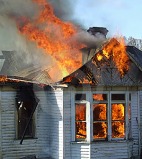
In 1931, Mary Jo and Jim lived in Wink, Texas. Mary was washing clothes with casing head gasoline, indoors, in a gyrating washing machine. The cooking stove was powered by natural gas. The gas from the stove traveled along the floor to the greasy clothes and the house exploded. A neighbor ran from across the street and rolled Mary Jo in the dirt to put out the flames. Janelle was 13 months old, Marjorie was 2 and Lloyd was 3. They were all in the kitchen at the time. Marjorie was hurt the least and Janelle the most. There were no hospitals and aunt Ruby (Jim's sister) cared for the young family. The men of the oilfield took up a collection of $90.00 for the family. In 1931 and the depression this was a huge amount of money.
The doctors told Jim that if he did not stretch Mary Jo's limbs she would be crippled all of her life. She begged him to not make her do the exercises but had he not done so, she would have been crippled. Jim was a very compassionate man and he cried with Mary Jo, but he knew he had to take care of business to ever get his wife back to normal. They did put a salve on her burns but her scars stayed with her throughout her lifetime.
The doctors told Jim that if he did not stretch Mary Jo's limbs she would be crippled all of her life. She begged him to not make her do the exercises but had he not done so, she would have been crippled. Jim was a very compassionate man and he cried with Mary Jo, but he knew he had to take care of business to ever get his wife back to normal. They did put a salve on her burns but her scars stayed with her throughout her lifetime.
Traveling with the family
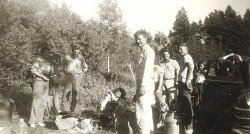
Jim and Mary Jo loved to travel. There were no hotels or motels along the way. It was all done with camping. Mary Jo said "we packed everything up in the car, the trunk and on top of the car and when we wanted to sleep we parked under a tree." Stopping at the fruit and vegetable stands along the journey was a way of life. We might have as many as 8 or 10 in the car at one time. We built up the back seat with the covers and sat on top of the bedding. We even slept on the back of the back seat.
We kept ourselves entertained though with family singing along the way.
It was a ritual with Jim, that every morning, long before any of the rest of the family was up, he would go down to the creek and take a bath in the spring water. It was mountain water so it was quite cold.
A family joke was that the family would have to wake Jim up as he drove. Mary Jo would ask, "Are you awake, Jim?" His answer was always-"Sure-I was just resting my eyes." We were glad the Lord was looking after us.
We kept ourselves entertained though with family singing along the way.
It was a ritual with Jim, that every morning, long before any of the rest of the family was up, he would go down to the creek and take a bath in the spring water. It was mountain water so it was quite cold.
A family joke was that the family would have to wake Jim up as he drove. Mary Jo would ask, "Are you awake, Jim?" His answer was always-"Sure-I was just resting my eyes." We were glad the Lord was looking after us.
Haskell, Texas
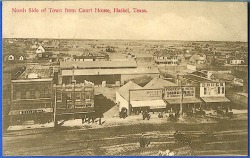
HASKELL, TEXAS. Haskell, the county seat of Haskell County, is at the junction of U.S. Highways 277 and 380 in the central part of the county. It was once on the Fort Worth and Denver Railway. The townsite was at one time known as Willow Pond Springs, a watering place for Indians, explorers, and buffalo hunters. A member of Randolph B. Marcy's 1849 expedition encouraged his brother, Thomas F. Tucker, to settle at the site in 1879. J. L. Jones and W. R. Standefer moved to the area in 1883. Tucker built a pole shack and called the place Rice Springs for Rice Durrett, an employee of the Reynolds and Matthews Cattle Company. Tucker became the first county judge when Haskell County was organized in 1885; that same year a post office was established, and the developing community was renamed Haskell, after Charles Ready Haskell, a soldier in the Texas Revolution who died at Goliad. Mrs. R. A. Standefer was the community's first postmistress. As the county seat, Haskell dominated regional trade and culture. Barbecues and dances were annual events, as were visits of the Mollie Baileyqv show, and later, the Harley Sadler tent show. A saloon known as the Road to Ruin was also used for church services. The Haskell Free Press began publication in 1886. Haskell prospered until the panic of 1893 and the drought of 1896; it recovered from these adversities after 1900, the year the Texas Central Railroad reached Stamford. Haskell acquired a rail line and organized a volunteer fire department in 1906; the community was incorporated in 1907. The town's population was reported as 2,611 in 1930, as 3,051 in 1940, and as 3,832 in 1950. In 1946 Haskell reported 114 businesses, including gins, creameries, canneries, and cottonseed oil mills (see COTTONSEED INDUSTRY). Discovery just before World War II of the Lawson oilfield, six miles east of Haskell, had a stabilizing influence on the local economy and population. Lake Stamford, twelve miles southeast, was built in the early 1950s to provide water for municipal and industrial use, as well as for boating, fishing, and swimming. By 1967 Haskell had an airport, a bank, a hospital, and eighteen churches. Its population reached a peak of 4,166 in 1970 and was reported as 3,782 in 1980, when the town had ninety-eight businesses. Haskell's population in 1990 was reported as 3,362. In 2000 the population was 3,106.
Driving could be an adventure with Jim
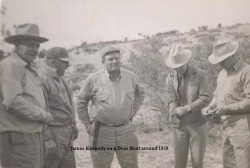
Lloyd wrote on May, 9, 1997.
It seems that Jim was driving and falling to sleep as he drove. The Seminole man (Joe McKinney) grew more and more nervous with Dad's driving and sleeping. He finally told Dad that maybe he had better let someone else drive so that they could all get to their destination and then they could all sleep. You see, Dad worked shift work, and that made it difficult for him to get enough sleep. He may also have had a sleeping sickness. I always wondered. He lived a hard life, working at the pipeline pump station full time and farming part time. Mary Jo said in a 1991 interview, "after the wrecked in 1936, I thought Jim might have had nerve damage from the 1936 wreck and that is what caused him to fall a sleep so easily.")
It seems that Jim was driving and falling to sleep as he drove. The Seminole man (Joe McKinney) grew more and more nervous with Dad's driving and sleeping. He finally told Dad that maybe he had better let someone else drive so that they could all get to their destination and then they could all sleep. You see, Dad worked shift work, and that made it difficult for him to get enough sleep. He may also have had a sleeping sickness. I always wondered. He lived a hard life, working at the pipeline pump station full time and farming part time. Mary Jo said in a 1991 interview, "after the wrecked in 1936, I thought Jim might have had nerve damage from the 1936 wreck and that is what caused him to fall a sleep so easily.")
Protection for the family

Lloyd wrote on May 9, 1997
Dad bought me a 22 Winchester semi-automatic rifle when I was 15 years old. For Christmas, I suppose it was. That would have been about 1943. World War II had been going on just over a year. There were frequent public service bulletins and advertisements about protecting against sabotage and saboteurs. Dad worked shift work then, 11 miles out in the country from Haskell, at a pipeline pump station. Only one man would work at a time and it would get lonely out there on evening and midnight shifts. So Dad would take the 22 with him to work, supposedly to protect against saboteurs. There weren't any saboteurs that I knew of, but Dad took the possibility of sabotage seriously. The real truth was that he always liked guns, and hunting, and Dad was at home when there were so many people out there going to many exciting places that he would have anted to go to, too. I doubt if he would have minded being drafted, but there was no way that anyone with as many children as he had, and at his age (he had 8 children after the twins were born on July 4th, 1943, and he was about 37 years old. Besides that, someone had to work on that pipeline and keep it running. It was classified as essential war work. I still have that rifle although Dad has used it much more than I ever did.
Dad bought me a 22 Winchester semi-automatic rifle when I was 15 years old. For Christmas, I suppose it was. That would have been about 1943. World War II had been going on just over a year. There were frequent public service bulletins and advertisements about protecting against sabotage and saboteurs. Dad worked shift work then, 11 miles out in the country from Haskell, at a pipeline pump station. Only one man would work at a time and it would get lonely out there on evening and midnight shifts. So Dad would take the 22 with him to work, supposedly to protect against saboteurs. There weren't any saboteurs that I knew of, but Dad took the possibility of sabotage seriously. The real truth was that he always liked guns, and hunting, and Dad was at home when there were so many people out there going to many exciting places that he would have anted to go to, too. I doubt if he would have minded being drafted, but there was no way that anyone with as many children as he had, and at his age (he had 8 children after the twins were born on July 4th, 1943, and he was about 37 years old. Besides that, someone had to work on that pipeline and keep it running. It was classified as essential war work. I still have that rifle although Dad has used it much more than I ever did.
Jim as a gambler farmer
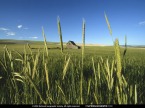
Lloyd - May 9, 1997
Occasionally when we travel to West Texas we drive from Abilene to Sweetwater and then to the next town named Roscoe, which is a junction point for turning towards Snyder. Every time I drive through that town I remember something that Dad did that I thought then was remarkable and I still think was remarkable. It mainly shows what a good man would do to make a living for his family. Dad rented a section of land north of Roscoe that had been used for years as an airport. The land had Johnson grass galore. Weeds too. But Dad thought it might make some money if he plowed that section of land and planted wheat. He had just a one year lease on the land, and he had paid a cash rent. Seems like it was about $2400 or some such figure. Which was a fairly good sized sum at that time. Well,first came plowing. Mr. Cagle and Mr. Darnell worked the farm for Dad. They went down to Roscoe and started plowing the land. Plowing land that hasn't been plowed for several years is hard work, hard on machinery, and time consuming. On one of his "three days off" periods he went down to Roscoe to help with the plowing. While there he was helping to adjust the "one way" plow and got his foot caught in one of the wheels. The wheel skidded until the tractor driver could get the tractor stopped. That bruised Dad's foot something awful, but he couldn't afford to stop. In fact, he didn't take his shoe off for three days because he knew that if he took it off he couldn't get the shoe back on because of the swelling. Lo and behold, the wheat crop was fairly good. When harvest time came, I worked about three weeks combining that wheat, probably with Mr. Cagle and Mr. Darnell. That was just one of the ways that our Dad made a living for a larger family than most people had in those days and in these days. He was able to take risks at a time when it would have been much easier to have stayed home and done without. Farming is still one of the greatest gambles in the world. Next time you drive through Roscoe, remember that our Dad had strong connection with that town for a year back in the 1940s.
Occasionally when we travel to West Texas we drive from Abilene to Sweetwater and then to the next town named Roscoe, which is a junction point for turning towards Snyder. Every time I drive through that town I remember something that Dad did that I thought then was remarkable and I still think was remarkable. It mainly shows what a good man would do to make a living for his family. Dad rented a section of land north of Roscoe that had been used for years as an airport. The land had Johnson grass galore. Weeds too. But Dad thought it might make some money if he plowed that section of land and planted wheat. He had just a one year lease on the land, and he had paid a cash rent. Seems like it was about $2400 or some such figure. Which was a fairly good sized sum at that time. Well,first came plowing. Mr. Cagle and Mr. Darnell worked the farm for Dad. They went down to Roscoe and started plowing the land. Plowing land that hasn't been plowed for several years is hard work, hard on machinery, and time consuming. On one of his "three days off" periods he went down to Roscoe to help with the plowing. While there he was helping to adjust the "one way" plow and got his foot caught in one of the wheels. The wheel skidded until the tractor driver could get the tractor stopped. That bruised Dad's foot something awful, but he couldn't afford to stop. In fact, he didn't take his shoe off for three days because he knew that if he took it off he couldn't get the shoe back on because of the swelling. Lo and behold, the wheat crop was fairly good. When harvest time came, I worked about three weeks combining that wheat, probably with Mr. Cagle and Mr. Darnell. That was just one of the ways that our Dad made a living for a larger family than most people had in those days and in these days. He was able to take risks at a time when it would have been much easier to have stayed home and done without. Farming is still one of the greatest gambles in the world. Next time you drive through Roscoe, remember that our Dad had strong connection with that town for a year back in the 1940s.
Farming near Haskell
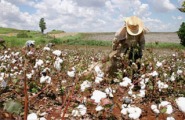
Lloyd wrote on May 9, 1997
How did Dad get his start farming? A man in Haskell name Date Anderson rented a farm about 5 miles wet of Haskell from a Mr. Koonce who lived near Dallas at a town named Boyd. In 1935, Dad bought an old steel wheel Farmall tractor and went into partnership with Mr. Anderson to rent a 222 acre place four miles north of Haskell from that same Mr. Koonce. Uncle Bryant and Aunt Ruby lived in an old house on that land. The well water tasted food when it was cold, but it contained sulfur, and it tended to stain teeth for children born while the children's mother lived on that land and used that well water. You can't imagine how tough times were in 1935. 1929 was the year of the great stock market crash. Many, many Americans were out of work. Our Dad had a job with Shell which provided his basic living. But his start in farming came in the partnership with Mr. Anderson. Well, the cotton crop was fairly good. And cotton prices were gaining a penny or two a pound. A few years later Dad bought 300 acres of land adjoining the 222 acres on the North. Mr. Cagle had gone broke on that land, and Dad bought it for about 30 or so dollars an acre. Later he sold it for $100 an acre which seemed like a lot of money in those days. One day I was walking with Harvey Eason along the west side of the 222 acres when Harvey suggested he would go around by the road but that I should cut through the field, but he would beat he to the house. So I started walking the rows. Well, Harvey had a scheme. He met Earlene Cagle at the corner, and I was of course completely out of the way. They married in 1938, I think it was, and won a radio by getting married in the movie theater.
How did Dad get his start farming? A man in Haskell name Date Anderson rented a farm about 5 miles wet of Haskell from a Mr. Koonce who lived near Dallas at a town named Boyd. In 1935, Dad bought an old steel wheel Farmall tractor and went into partnership with Mr. Anderson to rent a 222 acre place four miles north of Haskell from that same Mr. Koonce. Uncle Bryant and Aunt Ruby lived in an old house on that land. The well water tasted food when it was cold, but it contained sulfur, and it tended to stain teeth for children born while the children's mother lived on that land and used that well water. You can't imagine how tough times were in 1935. 1929 was the year of the great stock market crash. Many, many Americans were out of work. Our Dad had a job with Shell which provided his basic living. But his start in farming came in the partnership with Mr. Anderson. Well, the cotton crop was fairly good. And cotton prices were gaining a penny or two a pound. A few years later Dad bought 300 acres of land adjoining the 222 acres on the North. Mr. Cagle had gone broke on that land, and Dad bought it for about 30 or so dollars an acre. Later he sold it for $100 an acre which seemed like a lot of money in those days. One day I was walking with Harvey Eason along the west side of the 222 acres when Harvey suggested he would go around by the road but that I should cut through the field, but he would beat he to the house. So I started walking the rows. Well, Harvey had a scheme. He met Earlene Cagle at the corner, and I was of course completely out of the way. They married in 1938, I think it was, and won a radio by getting married in the movie theater.
Traveling with the Kennedys
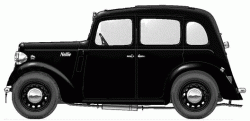
Lloyd- May 11, 1997
Although some might disagree--because they were long trips--we were blessed growing up by having a father that liked to travel. The first really long trip came in 1937. At that time there were four children. I was 9, Marjorie was 7, Janelle was 6 and Weldon was 2. In those days many, many Americans did not have paid vacations. Dad did. In fact, we traveled to California in 1937, 1938, 1939 and 1941. In 1940, we cut through and traveled to Yellowstone.
But this is a story about 1937. Dad had bought a 1937 Chrysler. It was a 4 door, it had a 6 cylinder engine. In that day, it was a good car. There were six of us in the car. We had to carry camping equipment, a tarp, cover and food in addition to the passengers.
When we arrived in California, a seventh person was added, Grandmother McElroy. She must have been about 80 or 85 at the time. Or maybe even 90. She lived a long life. I think she rode back as far as Salida, Colorado and caught a train back to California from there. But I keep digressing from the little story about Weldon.
We proceeded north from California and eventually came to the Columbia River that divides Oregon and Washington. What a mighty river that it was too. I remember one evening when we were camped on the Oregon side of the Columbia River that Dad and Mother bought a large fish to prepare for dinner. It was called a "steel-head trout." I don't know why I remember it, but I do remember that minor detail.
Crossing the river into Washington was a new experience. A ferry could somehow take cars across the river to the other side. The river was so swift that I never quite understood how the ferry could keep from floating down stream while crossing the river. I suppose that even in that day there were some powerful engines. But there may have been a cable stretched across the river that kept the ferry from floating down stream. I can't remember that detail.
We proceeded up to a wheat country area near Spokane, Washington. When night came Dad found a camp site in a wheat field. The owner of the field came out and talked with Dad out of concern for our setting that field on fire. Dad inspired confidence on such occasions. The farmer didn't chase us out of the wheat field, although in retrospect it seems to me it was risky to let someone camp in your wheat field.
We finally came to Yellowstone. I remember buying a cheap ring in a town called Gardner or Gardiner in Montana, just before entering the park. I remember seeing bear cubs along the way, that would climb a tree if you came near them. I remember going to a lecture by a forest ranger. He explained how one might tell the difference between a black bear and a grizzly. He said that if you walked close enough to the bear you could slap him on the back and if the bear climbed a tree he would likely be a black bear, but that if you climbed a tree the bear would likely be a grizzly. Which speaks to both the temper of these kinds of animals but speaks also to the ability of bears to climb trees. It seems that a grizzly did not have the kinds of claws that would permit him to climb a tree while the black bear did have such claws. I never did test the theory.
Bears then and now I understand raid garbage cans. In the night it was common to hear a commotion and find that there was a bear in the camp. You couldn't leave food out. A bear would frequently help himself to whatever he could find that was edible.
Now for the little story about Weldon. You understand that we were camping out, he was barely 2, he was walking and talking but he hadn't studied grammar yet. Someone asked him what he would do if a bear came into the camp. His answer was simple and I expect it has been repeated enough times that most have heard the story, but it was nevertheless thought to be a good answer at the time. He said "Me cover up," (No problem. He would be under the cover).
Although some might disagree--because they were long trips--we were blessed growing up by having a father that liked to travel. The first really long trip came in 1937. At that time there were four children. I was 9, Marjorie was 7, Janelle was 6 and Weldon was 2. In those days many, many Americans did not have paid vacations. Dad did. In fact, we traveled to California in 1937, 1938, 1939 and 1941. In 1940, we cut through and traveled to Yellowstone.
But this is a story about 1937. Dad had bought a 1937 Chrysler. It was a 4 door, it had a 6 cylinder engine. In that day, it was a good car. There were six of us in the car. We had to carry camping equipment, a tarp, cover and food in addition to the passengers.
When we arrived in California, a seventh person was added, Grandmother McElroy. She must have been about 80 or 85 at the time. Or maybe even 90. She lived a long life. I think she rode back as far as Salida, Colorado and caught a train back to California from there. But I keep digressing from the little story about Weldon.
We proceeded north from California and eventually came to the Columbia River that divides Oregon and Washington. What a mighty river that it was too. I remember one evening when we were camped on the Oregon side of the Columbia River that Dad and Mother bought a large fish to prepare for dinner. It was called a "steel-head trout." I don't know why I remember it, but I do remember that minor detail.
Crossing the river into Washington was a new experience. A ferry could somehow take cars across the river to the other side. The river was so swift that I never quite understood how the ferry could keep from floating down stream while crossing the river. I suppose that even in that day there were some powerful engines. But there may have been a cable stretched across the river that kept the ferry from floating down stream. I can't remember that detail.
We proceeded up to a wheat country area near Spokane, Washington. When night came Dad found a camp site in a wheat field. The owner of the field came out and talked with Dad out of concern for our setting that field on fire. Dad inspired confidence on such occasions. The farmer didn't chase us out of the wheat field, although in retrospect it seems to me it was risky to let someone camp in your wheat field.
We finally came to Yellowstone. I remember buying a cheap ring in a town called Gardner or Gardiner in Montana, just before entering the park. I remember seeing bear cubs along the way, that would climb a tree if you came near them. I remember going to a lecture by a forest ranger. He explained how one might tell the difference between a black bear and a grizzly. He said that if you walked close enough to the bear you could slap him on the back and if the bear climbed a tree he would likely be a black bear, but that if you climbed a tree the bear would likely be a grizzly. Which speaks to both the temper of these kinds of animals but speaks also to the ability of bears to climb trees. It seems that a grizzly did not have the kinds of claws that would permit him to climb a tree while the black bear did have such claws. I never did test the theory.
Bears then and now I understand raid garbage cans. In the night it was common to hear a commotion and find that there was a bear in the camp. You couldn't leave food out. A bear would frequently help himself to whatever he could find that was edible.
Now for the little story about Weldon. You understand that we were camping out, he was barely 2, he was walking and talking but he hadn't studied grammar yet. Someone asked him what he would do if a bear came into the camp. His answer was simple and I expect it has been repeated enough times that most have heard the story, but it was nevertheless thought to be a good answer at the time. He said "Me cover up," (No problem. He would be under the cover).
Vinegar pie
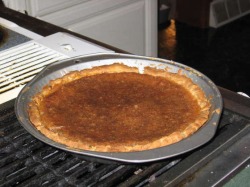
Lloyd- May 28, 1997
Once probably back in the early 1970s, I asked Mother what she ate when she was growing up in Eastern New Mexico. Her answer was not completely responsive but it was nevertheless interesting. Have you ever driven up from Clovis the 25 or so miles where Grandmother homesteaded? In the winter time that is a cold, barren bit of geography.
Mother answered "my Mother was a good cook. Sometimes we would go miles and miles in order to find wild plums to eat and cook with." Next she said that sometimes her mother would make vinegar pies. I inferred from this response that the daily meals were necessarily bland. I expect that they had milk from their cows, eggs from their chickens, sometimes meat from chickens, cattle and pigs, garden vegetables in the in the summer, canned garden vegetables in the winter, and perhaps potatoes that would keep for a while in the winter.
Just after Mother told this story we were at a church dinner. One of the older ladies knew what vinegar pie was and said she would make me one. She did. It wasn't as good as chocolate or coconut pie, but it wasn't bad. And I could better understand the emphasis on what Mother's mother cooked.
Receipe for Vinegar pie
Once probably back in the early 1970s, I asked Mother what she ate when she was growing up in Eastern New Mexico. Her answer was not completely responsive but it was nevertheless interesting. Have you ever driven up from Clovis the 25 or so miles where Grandmother homesteaded? In the winter time that is a cold, barren bit of geography.
Mother answered "my Mother was a good cook. Sometimes we would go miles and miles in order to find wild plums to eat and cook with." Next she said that sometimes her mother would make vinegar pies. I inferred from this response that the daily meals were necessarily bland. I expect that they had milk from their cows, eggs from their chickens, sometimes meat from chickens, cattle and pigs, garden vegetables in the in the summer, canned garden vegetables in the winter, and perhaps potatoes that would keep for a while in the winter.
Just after Mother told this story we were at a church dinner. One of the older ladies knew what vinegar pie was and said she would make me one. She did. It wasn't as good as chocolate or coconut pie, but it wasn't bad. And I could better understand the emphasis on what Mother's mother cooked.
Receipe for Vinegar pie
- 2 large eggs
- 1 cup sugar
- 1 tablespoon all-purpose flour
- 1 cup cold water
- 2 tablespoons cider vinegar
- Cinnamon for dusting
- Accompaniment: lightly sweetened whipped cream
- Special equipment: a 9- to 9 1/2-inch round fluted tart pan (1 inch deep) with removable bottom; pie weights or raw rice o 10 minutes more. Make filling while shell bakes:
- Whisk together eggs and 1/4 cup sugar in a bowl until blended well. Whisk together flour and remaining 3/4 cup sugar in a 1-quart heavy saucepan, then whisk in water and vinegar. Bring to a boil, whisking until sugar is dissolved. Add to egg mixture in a slow stream, whisking constantly.
- Pour filling into saucepan and cook over moderate heat, stirring constantly with a wooden spoon, until filling coats back of spoon and registers 175°F on an instant-read thermometer, 12 to 15 minutes. (Do not boil.) Immediately pour filling into a 2-cup glass measure. If pie shell is not ready, cover surface of filling with a round of wax paper.
- Reduce oven temperature to 350°F, then pour hot filling into baked pie shell in middle of oven and cover rim of crust with a pie shield or foil (to prevent overbrowning). Bake pie until filling is set, 15 to 20 minutes, then cool completely in pan on a rack. Dust evenly with cinnamon.
Drunk in the road
Lloyd- June 12, 1997
I must have been 12 or 13 when Dad, Mother and I were going to Dallas. It was very late and very dark. They were several routes from Haskell to Dallas but the closest is through Throckmorton.It must have been about 9:00 or 10:00 at night. There were very few cars on the highway. Suddenly in front of our car there was something or someone in the roadway in our lane. We could barely stop in time to keep from hitting it. It turned out to be a someone. Dad told Mother and me that this could be a hijacking. The person lying in the highway could be lying there to get traffic to stop and then be easy prey for a hijacking. One of the tidbits I remember is that low gear on the car we were driving was in the "up" position where second gear was usually located on steering wheel mounted gear shifts.I remember that Dad told Mother to get behind the wheel and to be ready to take off in a hurry if a hijacking should develop. We were all just a bit scared. Dad got out of the car and walked over to where this man was lying and soon learned that he was quite drunk. Dad helped him get into the car and we drove him a few miles to Newcastle and left him at the jail.
I often wondered how that drunk got out onto the highway where he could have been so easily been hit or killed. Did he get there on his own accord? Did someone get him drunk and let him out on the highway with the thought of getting the man killed? I never knew what happened to him.
I must have been 12 or 13 when Dad, Mother and I were going to Dallas. It was very late and very dark. They were several routes from Haskell to Dallas but the closest is through Throckmorton.It must have been about 9:00 or 10:00 at night. There were very few cars on the highway. Suddenly in front of our car there was something or someone in the roadway in our lane. We could barely stop in time to keep from hitting it. It turned out to be a someone. Dad told Mother and me that this could be a hijacking. The person lying in the highway could be lying there to get traffic to stop and then be easy prey for a hijacking. One of the tidbits I remember is that low gear on the car we were driving was in the "up" position where second gear was usually located on steering wheel mounted gear shifts.I remember that Dad told Mother to get behind the wheel and to be ready to take off in a hurry if a hijacking should develop. We were all just a bit scared. Dad got out of the car and walked over to where this man was lying and soon learned that he was quite drunk. Dad helped him get into the car and we drove him a few miles to Newcastle and left him at the jail.
I often wondered how that drunk got out onto the highway where he could have been so easily been hit or killed. Did he get there on his own accord? Did someone get him drunk and let him out on the highway with the thought of getting the man killed? I never knew what happened to him.
A granddaughter's memories
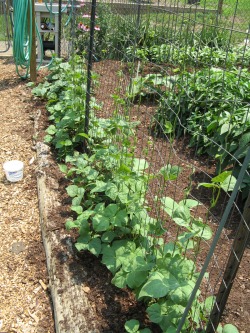
Jana Gillispie- May 12, 2010
Granddad let me ride with him to his leases for Shell, when I was young and he put me in charge of handing him the next gauge that he would use on the next lease. He always thought it was just not right to have all of the wasted land around the leases and nothing growing on that land. Granddad loved growing vegetables. The grandkids and kids had to help him to pick green beans that he had grown and would help him shell those green beans, as well as black eyed peas also. Sometimes we helped even when we did not want to.
Granddad always shared Christ with everyone with whom he came in contact. What a wonderful example of Christian living. When I think of those who have gone before us, I think of Ron being with Granddad, Grandmother, Aunt Glenda and Aunt Marjorie. Now that is quite a collection of saints.
Grandmother loved to play games endlessly with me. When it was my turn to play, she would say "now don't take forever," but when it was her turn she could take as much time as she liked. That was alright with me, because she was always the light of my life. I remember all the nights that Mother allowed me to spend the nights with Grandmother after Granddad passed away. I wanted to keep her from being so lonely. I was an early teenager. I also remember like it was yesterday, the day that Mother had me to come home, and it was the first time that everyone had gone home, and it would be her first night alone in the house. I remember her laying her head down on the gray brick fence at the end of the house, near the street, and how she cried and I cried also as we pulled away. Grandmother felt very much like I had a second Mother and I will always cherish my memories of her. I miss her so much!
Granddad let me ride with him to his leases for Shell, when I was young and he put me in charge of handing him the next gauge that he would use on the next lease. He always thought it was just not right to have all of the wasted land around the leases and nothing growing on that land. Granddad loved growing vegetables. The grandkids and kids had to help him to pick green beans that he had grown and would help him shell those green beans, as well as black eyed peas also. Sometimes we helped even when we did not want to.
Granddad always shared Christ with everyone with whom he came in contact. What a wonderful example of Christian living. When I think of those who have gone before us, I think of Ron being with Granddad, Grandmother, Aunt Glenda and Aunt Marjorie. Now that is quite a collection of saints.
Grandmother loved to play games endlessly with me. When it was my turn to play, she would say "now don't take forever," but when it was her turn she could take as much time as she liked. That was alright with me, because she was always the light of my life. I remember all the nights that Mother allowed me to spend the nights with Grandmother after Granddad passed away. I wanted to keep her from being so lonely. I was an early teenager. I also remember like it was yesterday, the day that Mother had me to come home, and it was the first time that everyone had gone home, and it would be her first night alone in the house. I remember her laying her head down on the gray brick fence at the end of the house, near the street, and how she cried and I cried also as we pulled away. Grandmother felt very much like I had a second Mother and I will always cherish my memories of her. I miss her so much!
RAINBOW
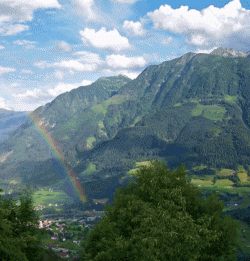
Weldon - May 17, 2010
A rainbow is a thing of beauty in its refraction of light and color. It is made even more notable being a visible reminder of the promise that God made that, following the flood, He would never destroy the earth by water again. It is impossible for me to look at a rainbow without thinking about God, remembering His greatness and His generosity towards mankind and, as it registers, towards me personally.
But rainbows are funny things. They accompany showers and mist and scientists could give all the reasons why they occur in nature. Sometimes there is a partial arc, sometimes a full arc, and occasionally, a double rainbow. And every color is manifested and merges in gradual degrees with other colors. The effect is subtle, artistic, and ethereal.
I remember as a young man traveling across Independence Pass in Colorado with my father. And as occurs in mountains, there were clouds and a rain shower in the distance across a small valley although the sun was shining where we were. And there was a rainbow with a mountain in the background. But the thing that impressed me most was the fact that we could actually see one end of the rainbow, could see where it met the earth right beside a remarkable tree. With all the legends about what might be found at the end of the rainbow, I was intrigued even though I understood that those tales were fantasies. But still, to think that I could actually see where the rainbow hit the earth was a wonderful thought and I wanted to go to that spot and stand in the glow of the rainbow’s end.
We were driving downhill on a winding road and you could see the road horseshoeing back behind the rainbow. My father suggested that I walk across that little valley to the rainbow’s end and he would be waiting for me on the road down below. So with great enthusiasm I set out on this quest for the rainbow’s end.
I took a fast pace in and out of trees, but always had my destination in sight under that one big tree. And I arrived at the very spot! The rainbow was still in the sky, but the end had moved! It was not where it had been. What a letdown!
But through the years, I came to understand that, with the refraction of light in relationship to where I was the rainbow’s end would always be somewhere where I was not. When I moved, it moved. There was nothing really mysterious about it. It was just the way that nature worked.
In living my life, like many other people, I have searched for the “pot of gold” at the end of the rainbow. I would search for the time and the place where I would “arrive” at some treasured spot or circumstance. But just like the end of a real rainbow, when I reached that spot or circumstance, something had changed. The end of the rainbow was not there. It had moved!
That perfect spot has always remained elusive. No matter how successful we might be, there is always something that we do not have, some feat that we have not accomplished, some other ‘rainbow’s end’.
Understanding the effect of a real rainbow has helped my understanding about the ends of other illusory rainbows in my life. As others have learned before me, it is the quest that counts and not necessarily the arrival at the end of the rainbow. Life occurs along the journey, not at the end of the rainbow.
Weldon C. Kennedy
A rainbow is a thing of beauty in its refraction of light and color. It is made even more notable being a visible reminder of the promise that God made that, following the flood, He would never destroy the earth by water again. It is impossible for me to look at a rainbow without thinking about God, remembering His greatness and His generosity towards mankind and, as it registers, towards me personally.
But rainbows are funny things. They accompany showers and mist and scientists could give all the reasons why they occur in nature. Sometimes there is a partial arc, sometimes a full arc, and occasionally, a double rainbow. And every color is manifested and merges in gradual degrees with other colors. The effect is subtle, artistic, and ethereal.
I remember as a young man traveling across Independence Pass in Colorado with my father. And as occurs in mountains, there were clouds and a rain shower in the distance across a small valley although the sun was shining where we were. And there was a rainbow with a mountain in the background. But the thing that impressed me most was the fact that we could actually see one end of the rainbow, could see where it met the earth right beside a remarkable tree. With all the legends about what might be found at the end of the rainbow, I was intrigued even though I understood that those tales were fantasies. But still, to think that I could actually see where the rainbow hit the earth was a wonderful thought and I wanted to go to that spot and stand in the glow of the rainbow’s end.
We were driving downhill on a winding road and you could see the road horseshoeing back behind the rainbow. My father suggested that I walk across that little valley to the rainbow’s end and he would be waiting for me on the road down below. So with great enthusiasm I set out on this quest for the rainbow’s end.
I took a fast pace in and out of trees, but always had my destination in sight under that one big tree. And I arrived at the very spot! The rainbow was still in the sky, but the end had moved! It was not where it had been. What a letdown!
But through the years, I came to understand that, with the refraction of light in relationship to where I was the rainbow’s end would always be somewhere where I was not. When I moved, it moved. There was nothing really mysterious about it. It was just the way that nature worked.
In living my life, like many other people, I have searched for the “pot of gold” at the end of the rainbow. I would search for the time and the place where I would “arrive” at some treasured spot or circumstance. But just like the end of a real rainbow, when I reached that spot or circumstance, something had changed. The end of the rainbow was not there. It had moved!
That perfect spot has always remained elusive. No matter how successful we might be, there is always something that we do not have, some feat that we have not accomplished, some other ‘rainbow’s end’.
Understanding the effect of a real rainbow has helped my understanding about the ends of other illusory rainbows in my life. As others have learned before me, it is the quest that counts and not necessarily the arrival at the end of the rainbow. Life occurs along the journey, not at the end of the rainbow.
Weldon C. Kennedy
Life In a Small Texas Town
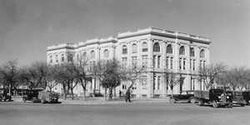
By Weldon C. Kennedy
The late 1940s were special years. World War II ended in 1945. I remember August 14, 1945, when Japan surrendered. In the small West Texas town where I lived, the town’s sirens began to wail and continued for hours, it seemed, celebrating that glorious occasion. Everybody in town gravitated to the city square where the local fire trucks went round and round the courthouse with people hanging on all sides, laughing and waving, the fire engines’ sirens adding to the cacophony of the main siren mounted by the water tower.
Every face that you saw was glowing, exuding joyous feelings at the end of the great conflict. There were many local boys who had gone off to war. Some would never return. Some had come back minus limbs or showing some other injury. Some looked the same except they looked older than their years. One young man had left for war with a full head of dark black hair. When he returned, it was white-gray, the story being told that it turned overnight.
We did not know much about the reality of the war. What we did know we learned from newspapers, Life Magazine, and from the movie clips/war news that preceded movies in the theatres. All that news was accompanied by military brass bands that stirred the soul. To those at home, all the soldiers were heroes. This war had been noble and glorious unless you had experienced having someone in your family or some friend that had been killed or wounded in battle. That tended to shade the perspective somewhat.
But life began to transition to peacetime. During the war there had been gas rationing, and a point system/rationing system for buying meat or tires for your car. But now goods were beginning to be more available. The manufacture of automobiles had pretty much ceased for the civilian population during the war. Around 1947, a few Nash Autos began to be seen on the streets. And then Studebakers began to show up with a radical new body style that appeared like something from another planet to many people.
People were concerned about jobs for the returning soldiers. But as it happened, a post-war boom began. Construction of new houses became a major motivating force for the economy. People needed everything and as new-found prosperity set in, a wave of buying boosted the economy even more.
Living in a small farm town, the local economy was tied very specifically to crops, whether the rain fell when needed, what the price of cotton or wheat might be. There were a few professional people like doctors, lawyers, or accountants. But most jobs other than farm jobs and those few professionals were limited to retail sales clerks, nurses, plumbers, electricians, and other service industries needed by a general population. There were very few really prosperous citizens, although in a year with good crops, money would flow through the community at a pretty good pace. My father worked for a pipe line company, but farmed on the side. I remember the many times when I would hear him say, “if it doesn’t rain soon, we are gonna be ruined”! To a small child, I heard that many times and lived in fear that we were going to be out on the street any time if it did not rain. My father’s statement was never quite accurate, but I didn’t know that. I told myself that, “when I get grown, I am not going to be a farmer”. And I never changed my mind about that.
In a small town, social activities were centered around church and around school affairs. My family was always very active in church. We went to church Sunday morning, Sunday evening, and Wednesday evening. And every summer, we would have gospel meetings. These usually lasted ten days to two weeks with perhaps a session early in the mornings and then another session at night. The mindset was pretty much that, if you were a faithful Christian, you attended every service that was possible for you to attend.
Of course, in those days, we didn’t have TV. And the old gospel “fire and brimstone” preachers were pretty entertaining, pretty good “theatre”. There was the disadvantage that they could sometimes create an extreme amount of concern and fear for the destiny of your soul. In fact, their stock in trade was their ability to do that very thing. Still, on a summer’s night, it gave us somewhere to go, something to do that held our interest. We would sometimes even visit gospel meetings of other religions even though we might not agree with their theology.
In the fall, though, football was king. The fall was when the cotton crop was brought in. The local gin was about 200 yards away from the football field and on those cold, crisp, fall Friday nights, they were often burning cotton burrs in a huge incinerator at the gin. The smell of smoke was in the air, not in unbearable amounts, but very noticeable, nonetheless. And for years, the smell of cotton burrs burning would cause a feeling of nostalgia to sweep over me, taking me back to that period of life. Football and cotton burr smoke became very intertwined in my mind.
On Friday nights, nearly every person in town was at the game. The recent graduates would hang over the field fence in their football letter jackets from previous years cheering the team on. They sometimes had choice remarks to make about the referees, as well. But everyone from the town was immersed in this Friday night ritual. The brass band was pretty good and it was loud and it added to the general perception of the fans and the participants. The excitement was real and the excitement seemed personal to everyone in attendance.
And when the home team won, it was an exhilarating time. And when the team lost, the despair was almost palpable. It seemed hard to remember that it was just a game.
The next door neighbor was a little older than I was and usually took the lead in the various activities in which young boys find themselves. It was mostly pretty harmless though at times we did things that people did not like and, if our parents found out, reckoning was swift and sure. The neighbor’s father was a bank officer in the bank on the downtown square and his son in later years grew up to be a bank president himself. But as a youngster, he had a paper route for the Ft. Worth Star Telegram. He finally moved on and handed off the paper route to me when I was thirteen years old. There were eighty-two people on the route and the hardest part was in collecting which I did weekly. Everyone paid all right, but you had to catch them at home which sometimes proved difficult.
My most notable customer was John Kimbrough, or as they called him in football circles, “Jarring John Kimbrough”. He had been an All-American fullback on the Texas A & M national championship football team in 1939. I had been a little too young for that to register at the time, but every service station in town had his picture mounted on the wall. His brother, as well as his mother, was also on my paper route. His mother’s living room was actually a trophy room for John’s many awards. Some of those trophies were almost as tall as I was. When I would go around and collect for the paper, she would very proudly show me all of the trophies and explain what they were and where each one came from.
From a distant memory, it seemed that John had gone to Hollywood and made a couple of old style cowboy movies. I expect that I saw them somewhere along the way, but cannot actually remember that. But around 1948 he had returned to his home town. He became a Gulf Oil Distributor. Since I live in Bryan/College Station, I often attend Aggie football games. At almost every game, there is an old black and white film showing “Jarring John Kimbrough” on the giant screen on the field, along with films of other notables and other games.
During the 2007 football season, all of the surviving members of the 1939 team were presented at an A & M game halftime and John was in the group, the first time that I had seen him since about 1949. He has since passed on.
And, of course, I remember his cousin, Margaret Kimbrough, who was in our class. She lived on a farm about three miles north of Haskell. Her married name was Williams; she died in 2010, a very gracious and nice lady.
My family moved away from Haskell in the summer of 1949, after my ninth year of school.
Haskell, Texas.. A good place with good people, and wonderful memories. Weldon Kennedy January 16, 2011
The late 1940s were special years. World War II ended in 1945. I remember August 14, 1945, when Japan surrendered. In the small West Texas town where I lived, the town’s sirens began to wail and continued for hours, it seemed, celebrating that glorious occasion. Everybody in town gravitated to the city square where the local fire trucks went round and round the courthouse with people hanging on all sides, laughing and waving, the fire engines’ sirens adding to the cacophony of the main siren mounted by the water tower.
Every face that you saw was glowing, exuding joyous feelings at the end of the great conflict. There were many local boys who had gone off to war. Some would never return. Some had come back minus limbs or showing some other injury. Some looked the same except they looked older than their years. One young man had left for war with a full head of dark black hair. When he returned, it was white-gray, the story being told that it turned overnight.
We did not know much about the reality of the war. What we did know we learned from newspapers, Life Magazine, and from the movie clips/war news that preceded movies in the theatres. All that news was accompanied by military brass bands that stirred the soul. To those at home, all the soldiers were heroes. This war had been noble and glorious unless you had experienced having someone in your family or some friend that had been killed or wounded in battle. That tended to shade the perspective somewhat.
But life began to transition to peacetime. During the war there had been gas rationing, and a point system/rationing system for buying meat or tires for your car. But now goods were beginning to be more available. The manufacture of automobiles had pretty much ceased for the civilian population during the war. Around 1947, a few Nash Autos began to be seen on the streets. And then Studebakers began to show up with a radical new body style that appeared like something from another planet to many people.
People were concerned about jobs for the returning soldiers. But as it happened, a post-war boom began. Construction of new houses became a major motivating force for the economy. People needed everything and as new-found prosperity set in, a wave of buying boosted the economy even more.
Living in a small farm town, the local economy was tied very specifically to crops, whether the rain fell when needed, what the price of cotton or wheat might be. There were a few professional people like doctors, lawyers, or accountants. But most jobs other than farm jobs and those few professionals were limited to retail sales clerks, nurses, plumbers, electricians, and other service industries needed by a general population. There were very few really prosperous citizens, although in a year with good crops, money would flow through the community at a pretty good pace. My father worked for a pipe line company, but farmed on the side. I remember the many times when I would hear him say, “if it doesn’t rain soon, we are gonna be ruined”! To a small child, I heard that many times and lived in fear that we were going to be out on the street any time if it did not rain. My father’s statement was never quite accurate, but I didn’t know that. I told myself that, “when I get grown, I am not going to be a farmer”. And I never changed my mind about that.
In a small town, social activities were centered around church and around school affairs. My family was always very active in church. We went to church Sunday morning, Sunday evening, and Wednesday evening. And every summer, we would have gospel meetings. These usually lasted ten days to two weeks with perhaps a session early in the mornings and then another session at night. The mindset was pretty much that, if you were a faithful Christian, you attended every service that was possible for you to attend.
Of course, in those days, we didn’t have TV. And the old gospel “fire and brimstone” preachers were pretty entertaining, pretty good “theatre”. There was the disadvantage that they could sometimes create an extreme amount of concern and fear for the destiny of your soul. In fact, their stock in trade was their ability to do that very thing. Still, on a summer’s night, it gave us somewhere to go, something to do that held our interest. We would sometimes even visit gospel meetings of other religions even though we might not agree with their theology.
In the fall, though, football was king. The fall was when the cotton crop was brought in. The local gin was about 200 yards away from the football field and on those cold, crisp, fall Friday nights, they were often burning cotton burrs in a huge incinerator at the gin. The smell of smoke was in the air, not in unbearable amounts, but very noticeable, nonetheless. And for years, the smell of cotton burrs burning would cause a feeling of nostalgia to sweep over me, taking me back to that period of life. Football and cotton burr smoke became very intertwined in my mind.
On Friday nights, nearly every person in town was at the game. The recent graduates would hang over the field fence in their football letter jackets from previous years cheering the team on. They sometimes had choice remarks to make about the referees, as well. But everyone from the town was immersed in this Friday night ritual. The brass band was pretty good and it was loud and it added to the general perception of the fans and the participants. The excitement was real and the excitement seemed personal to everyone in attendance.
And when the home team won, it was an exhilarating time. And when the team lost, the despair was almost palpable. It seemed hard to remember that it was just a game.
The next door neighbor was a little older than I was and usually took the lead in the various activities in which young boys find themselves. It was mostly pretty harmless though at times we did things that people did not like and, if our parents found out, reckoning was swift and sure. The neighbor’s father was a bank officer in the bank on the downtown square and his son in later years grew up to be a bank president himself. But as a youngster, he had a paper route for the Ft. Worth Star Telegram. He finally moved on and handed off the paper route to me when I was thirteen years old. There were eighty-two people on the route and the hardest part was in collecting which I did weekly. Everyone paid all right, but you had to catch them at home which sometimes proved difficult.
My most notable customer was John Kimbrough, or as they called him in football circles, “Jarring John Kimbrough”. He had been an All-American fullback on the Texas A & M national championship football team in 1939. I had been a little too young for that to register at the time, but every service station in town had his picture mounted on the wall. His brother, as well as his mother, was also on my paper route. His mother’s living room was actually a trophy room for John’s many awards. Some of those trophies were almost as tall as I was. When I would go around and collect for the paper, she would very proudly show me all of the trophies and explain what they were and where each one came from.
From a distant memory, it seemed that John had gone to Hollywood and made a couple of old style cowboy movies. I expect that I saw them somewhere along the way, but cannot actually remember that. But around 1948 he had returned to his home town. He became a Gulf Oil Distributor. Since I live in Bryan/College Station, I often attend Aggie football games. At almost every game, there is an old black and white film showing “Jarring John Kimbrough” on the giant screen on the field, along with films of other notables and other games.
During the 2007 football season, all of the surviving members of the 1939 team were presented at an A & M game halftime and John was in the group, the first time that I had seen him since about 1949. He has since passed on.
And, of course, I remember his cousin, Margaret Kimbrough, who was in our class. She lived on a farm about three miles north of Haskell. Her married name was Williams; she died in 2010, a very gracious and nice lady.
My family moved away from Haskell in the summer of 1949, after my ninth year of school.
Haskell, Texas.. A good place with good people, and wonderful memories. Weldon Kennedy January 16, 2011
A Hard headed Child but still in her Daddy's heart.
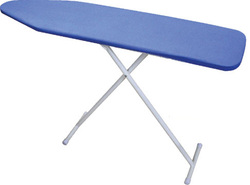
While I was ironing this morning, I thought about how much we had to iron when I was a child. As you know, there were many in our household, but by the time I was at the ironing age (11 probably), the oldest 3 children had left the house. But that still left Mother and Daddy, Edna, Weldon, the twins, and myself. I preferred ironing to cooking because I could listen to the radio and dance around the ironing board AND when I cooked, I had lots of unwelcome input from the sisters. SO I ironed, and ironed, and ironed. We washed on Saturday and put the clothes out on the clothesline. As soon as they began to even be a little dry, the ironing started and that took the rest of the day and part of the next day. But your smart aunt was so proud of herself! I bragged to Mother how nicely I ironed Daddy's khakkies--and you remember how big Daddy was! Guess who got that job the rest of the time I was at home. Oh, well!
But we talked about Daddy a little while on our trip last week. I don't know if others felt this way, but I felt like Daddy was not comfortable conversing with me. Maybe it was because I am female and maybe it was because he had his mind on how to make the next payment on the farm. Regardless, just about all he said to me was for me to "be a good girl!" When he said that one time, I reminded him that he always said that I was much like Mother so why did he say that? He said, "that is why!" Anyway, it is a memory.
I have not checked the web site lately, and you may have already included the fact that I was the one pushing the limit. I was the one who got the spankings. Grandpa was often responsible for that. He would chant "Don't whip her, Jim." Of course, that added fuel to the fire. My siblings begged me to cry to get the episodes behind all of us. I guess you might say I was stubborn. Some of the time I did not deserve the spankings (at least when they started), but I am sure I did before they ended.
So much for all that... Sandra Gail Herod January 2013
God's sense of Humor
I tried to find out what year this memorable Communion supper took place but neither the Eckerts nor Bill could recall BUT we all well remember one weekend that we visited Mary and Miles at their place in the hills of Ft. Davis.
Mother was there, and Mary thinks Fannie Anderson was also. We were out in the
boonies and of course, had church. But we did not take communion bread. Mother and Mary made some. And that was a good thing BUT they served it on tinfoilplates and that was a BAD thing. Every time anyone took some of the bread, the plate crackled. Naturally, we all got tickled. We just hope God had a sense of humor.
Then I know you remember the church service a couple of years ago at Steven's and Lesa's house in
Eastland. I lost my job for preparing the cup. I even tasted the grape juice and just knew it was the right thing. I thought it was some grape juice that I had poured up after preparing Bill's disgusting concoction that he drinks every
morning and thinks it helps arthritis: grape juice, apple juice, honey and vinegar. Yes, that is what we had that Sunday morning. Lesa fired me!
Mother was there, and Mary thinks Fannie Anderson was also. We were out in the
boonies and of course, had church. But we did not take communion bread. Mother and Mary made some. And that was a good thing BUT they served it on tinfoilplates and that was a BAD thing. Every time anyone took some of the bread, the plate crackled. Naturally, we all got tickled. We just hope God had a sense of humor.
Then I know you remember the church service a couple of years ago at Steven's and Lesa's house in
Eastland. I lost my job for preparing the cup. I even tasted the grape juice and just knew it was the right thing. I thought it was some grape juice that I had poured up after preparing Bill's disgusting concoction that he drinks every
morning and thinks it helps arthritis: grape juice, apple juice, honey and vinegar. Yes, that is what we had that Sunday morning. Lesa fired me!
An Angel Came to Visit
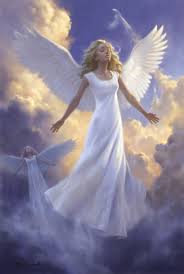
When Daddy was in the hospital in Andrews (at the time of his death), Mother, Marjorie, Glenda and I stayed at night in a camper parked at the back door of the hospital. Glen Sullivan took it over there for us. I was the only one still in the camper the morning Daddy died. A lady--and I will always believe it was an angel--pounded on the door and said "if you want to see your daddy alive again, you had better get up to the second floor." I hurriedly dressed on buttoning my blouse as I ran up the stairs. The others were already up there and had no idea Daddy was in trauma until they saw my face. Of course, we didn't see him alive again but he was pronounced dead not long after I got up there. I have always thought it was important that I be with the others at the time and that is why I got the message. It still gives me a sense of wonder when I think about it.
Sandra Herod, June, 2013
Sandra Herod, June, 2013